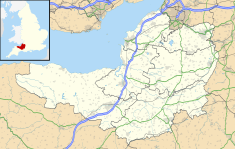| Beckford's Tower | |
|---|---|
| Lansdown Tower | |
 Beckford's Tower with part of the surrounding cemetery | |
| Location | Lansdown Hill, Bath, Somerset, England |
| Coordinates | 51°24′23″N 2°22′44″W / 51.4064°N 2.3789°W |
| Height | 154 feet (47 m) |
| Built | 1827 |
| Built for | William Thomas Beckford |
| Restored | 1972 (house), 1997-2000 (tower) |
| Restored by | J. Owen Williams (house), Caroe & Partners, Mann Williams Structural Engineers (tower) |
| Architect | Henry Goodridge |
| Owner | The Beckford Tower Trust (Bath Preservation Trust) |
Listed Building – Grade I | |
| Official name | Beckford's Tower, with attached wall and railings |
| Designated | 11 August 1972[1] |
| Reference no. | 1394133 |
| Official name | Lansdown Cemetery and Beckford's Tower |
| Designated | 30 April 1987[2] |
| Reference no. | 1000563 |
Beckford's Tower, originally known as Lansdown Tower, is an architectural folly built in neo-classical style on Lansdown Hill, just outside Bath, Somerset, England. The tower and its attached railings are designated as a Grade I listed building.[1] Along with the adjoining Lansdown Cemetery it is Grade II listed on the Register of Historic Parks and Gardens of special historic interest in England.[2]
The tower was built for William Thomas Beckford, a wealthy novelist, art collector and critic, to designs by Henry Goodridge, and was completed in 1827. Beckford used it as a library and a retreat, with the cupola at the top acting as a belvedere providing views over the surrounding countryside. The Italianate building at the base of the tower housed drawing rooms and a library. Extensive grounds between Beckford's house in Lansdown Crescent and the tower were landscaped and planted to create Beckford's Ride.
Following Beckford's death in 1844, the tower and lands were donated to Walcot parish and a burial ground created, with the Scarlet Drawing Room being converted into a chapel. In 1931 the house and tower were damaged by a fire and a public appeal was made for funds for its restoration. The cemetery closed in 1992 and the next year the site was bought by the Bath Preservation Trust who have carried out extensive renovation. It is now home to a museum displaying furniture originally made for the tower and paintings, prints and objects illustrating Beckford's life as a writer, collector and patron of the arts.
William Beckford's ability to build, and to collect, was made possible by the wealth he inherited, and continued to accumulate, as an owner of plantations and enslaved people, and latterly through the compensation he received from the government following the abolition of slavery;[3] these conditions, events, and both the historical and particular contexts, are considered within the displays accompanying exhibits at The Beckford Tower Museum .[4]
- ^ a b Historic England. "Beckford's Tower, with attached wall and railings (1394133)". National Heritage List for England. Retrieved 20 February 2016.
- ^ a b Historic England. "Lansdown Cemetery and Beckford's Tower (1000563)". National Heritage List for England. Retrieved 20 February 2016.
- ^ "Beckford and the Slave Trade" (PDF).
- ^ "Beckford's Tower homepage". Beckford's Tower and Museum. Retrieved 22 June 2020.
